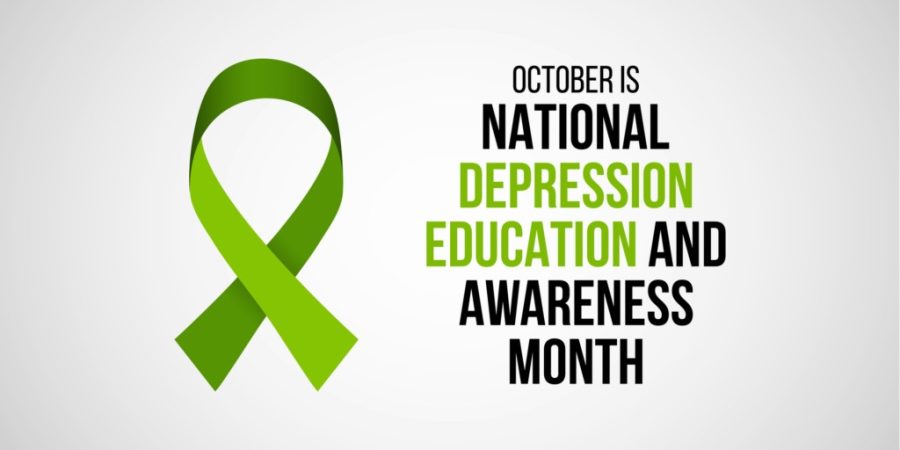
Depression affects 322 million people around the world. In the US, over 17 million adults experience depression each year, and many additional cases of depression go unreported. To help raise public awareness about the problem of depression, behavioral health advocates participate in Depression Awareness Month each October.
With the coronavirus pandemic, massive job loss, and widespread financial insecurity, the risk of depression and anxiety is more prevalent than ever in the US. According to a survey from the Centers for Disease Control and Prevention, approximately one third of Americans have reported symptoms of anxiety and depression since the pandemic began. And veterans face unique mental health risks. So now more than ever, it’s important for military personnel to examine their mental well-being.
Table of Contents
What Is Depression Awareness Month?

To help raise depression awareness, October has been designated by several mental health organizations as Depression Awareness Month. and in particular, October 8th as Depression Awareness Day.
Like how wearing pink ribbons is a sign of support for breast cancer awareness, the official depression awareness color is green. People wear the green depression awareness ribbon to promote awareness and recognition of depression as a disease. Depression Awareness Month is also a time for people to try and raise funding for research into treatment for depression. And more than that, it’s also a time to inform people about the experiences of those who live with depression.
Depression Awareness Month is not only about helping those who know they are depressed. It’s also about helping those who may feel that they don’t need help. Raising depression awareness helps people feel more comfortable about opening up about their experience. And it also helps those around them to recognize the signs of depression in somebody who is otherwise in denial.
For veterans, it can be hard to recognize an issue with depression or other trauma-related issues. Additionally, veterans often struggle with asking for help once they spot a problem. This is because military personnel are trained to handle their own issues, but that doesn’t always work in civilian life. That’s why, during and outside of Depression Awareness Month, veterans need to take stock of their mental health.
What Is Clinical Depression?
Clinical depression, also called major depressive disorder, is a medical condition characterized by a constantly depressed mood and loss of motivation or interest, to the point that it causes significant impairment to your daily life. The exact cause of clinical depression is unknown. But depression is tends to run in families, and can be a chronic or temporary condition.
Somebody who is depressed is not just unhappy—they’re medically incapable of feeling happy or motivated. When a person is depressed, the person’s sadness extends for months or years. The feelings of sadness may also be particularly intense, and come alongside feelings of worthlessness and general apathy. Depression also may come with physical symptoms, such as sudden changes in a person’s sleep schedule and appetite.
Depression is one of the most common mental illnesses in the United States, affecting an estimated 11 million adults. This is part of what makes Depression Awareness Month so important. Most people, especially veterans, have been taught that they aren’t supposed to talk about mental health issues. As a result, they often feel alone when clinical depression occurs, but it’s actually very common. In 2015, over 17 million adults in the United States had at least one major depressive episode. About 13% of men and 21% of women will develop major depressive disorder in their lifetime. So this Depression Awareness Month, make an effort to keep an eye out for depression in yourself and loved ones.
Common signs of depression include:
- Excessive feelings of insecurity, guilt, sadness, or hopelessness
- Listlessness and the loss of interest in activities or hobbies you used to enjoy
- Restlessness and insomnia
- Fatigue and excessive sleeping
- Weight loss and weight gain
- Suicidal thoughts or a suicide attempt
How Does Depression Affect Veterans?

Some people are born depressed, and some people develop depression as a result of the experiences they’ve had. While some veterans have experienced depression before their enlistment, others develop depression as a result of what they’ve been through during and after their period of service. Approximately 12 percent of veterans in the US report elevated levels of depression or anxiety, according to a study done at the Stanford University School of Medicine
Military service comes with a cost to mental health. Not just because of the risk of bodily harm, but also because of the long hours and responsibilities that come with it. Many in the military feel hesitant to seek help for the mental stress that they experience, because of an assumption that they’ll seem weak or that they’re letting their fellow service members down if they see a medical professional.
This burden doesn’t become any lighter after separation from the service. When they lose the rigid routine and common camaraderie of serving in the armed forces, many veterans feel like they’ve been set adrift. As a result, they can struggle to find a new meaning in their civilian lives. After spending years with a clearly defined mission and responsibilities, it becomes easy to feel unmotivated and purposeless without that central focus.
This problem is worsened in those who have had traumatic experiences in the course of their service, who often feel like others who haven’t also served in the military and been through something similar can’t possibly understand the circumstances around their experiences. In cases where depression and PTSD are co-occurring, it can be almost impossible for those who need it to decide to seek help. And the only way for that to get better is if there is an increase in depression awareness, which is part of what makes Depression Awareness Month so important.
The Link Between Depression and Addiction
Substance abuse and addiction are increasingly common issues among the veteran population. The Substance Abuse and Mental Health Services Administration (SAMHSA) has found that one in 15 veterans struggle with a substance use disorder.
Many veterans who feel like they shouldn’t seek treatment for their mental health issues turn to drug use as a way to self-medicate and get through daily life. They think that they simply use their drug of choice to relax, without realizing that the only time they feel relief from the symptoms of depression is when they’re intoxicated. This is an important facet of depression to be aware of during Depression Awareness Month.
Self-medicating leads to developing a reliance on substance abuse that can be harmful to your health and personal life. And often, this worsens the underlying co-occurring disorder of depression or service-related PTSD. Mental illnesses that co-occur with addiction should always be handled together, rather than separately, but it can be difficult to find veteran-focused addiction treatment centers that offers comprehensive treatment.
Getting Help During Depression Awareness Month
A major barrier to mental health treatment continues to be that mental health facilities require clients to be sober upon enrollment. This rejects anyone who is currently struggling with substance abuse and makes it more difficult for those with drug addiction issues and mental health issues to get sober and stay sober. And an important message during Depression Awareness Month is that depression often affects all areas of life, including substance use.
At Hero’s Mile addiction treatment center, our veteran rehab program incorporates a complete treatment plan that addresses all of the unique needs of each individual. Hero’s Mile comprehensive treatment options include:
- Medically Supervised Drug and Alcohol Detox
- Residential Substance Abuse Rehab for Veterans
- Partial Hospitalization Program for Veterans
- Intensive Outpatient Program for Veterans
You do not have to suffer with substance abuse or feelings of despair. Our veteran rehab center is dedicated to helping people just like you. If you’re ready to talk about your options, call our admissions specialists at 888-838-6692 or ask your questions online with our confidential contact form.
The post Why Depression Awareness Month Is Important for Veterans appeared first on Heroes’ Mile Veterans Recovery Center.
Source
Original Author: Heroes’ Mile

